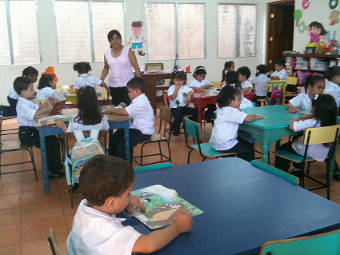
In 1965, the Unesco proclaimed the day 8th September as International Literacy Day, which defines as “a human right, a personal autonomous instrument and a means of reaching the individual and social development”. With this objective, Universitat de València, through Programme 0,7, has developed a school project in Masaya (Nicaragua) that guarantees the solution to the education problem in the zone to more than 500 students.
It is about the reconstruction of the School Nuestra Señora del Pilar, reduced to rubbles after the year 2000’s earthquake. Universitat de València, through the Programme 0,7 Una Nau de Solidaritat, and the Solidary Association Madre Josefa Campos, from the Religious Institute Operarias Catequistas de Nuestra Señora de los Dolores, have pulled together since the academic year 2009-2010 until now to recover the destroyed centre and even improve it, guaranteeing this way the primary education of 270 students, as well as of all the students of the school (over 500 children).
The project has been extended for six years. “With the earthquake of the year 2000, cracks started to develop in the new parts of the school (in primary and secondary) and the oldest part, where the dispensary -the medical centre- was, collapsed. The zone where the first classrooms were, became uninhabitable and the roof of the part that is used now for primary was in a very bad state due to the filtration of the heavy rains that, at the same time, caused important damages in the ceiling and in the walls”, explain the responsibles of the project.
Two of them are Clara Andrés Martí and Yolanda Andrés Fijo, members of the Spanish solidary association and graduated by Universitat de València. The implementation of the plan took place in four phases. During the three first phases, it was recovered, with the help of the nunciature in Nicaragua, the dispensary -fundamental since the free healthcare of the population of the zone, near 140.000 unhabitants, depends on it; and it started the intervention of Universitat de València with the reconstruction of the lecture room building, that was restructured: it was added the first level of Childhood Education with two new classrooms, an audiovisual room for polyvalent use and a computer room.
The fourth phase, which has just finished, allowed for the construction of a new roof for primary and the remodelling of one of the destroyed zones by the 2000’s earthquake, where an inner courtyard for the little ones to play and a library have been established. “This project is oriented to solve the education problem of the zone”, indicate the same sources.
The city of Masaya lies about 30 kilometres from the capital city, Managua, and it is a zone where the illiteracy has been maintaining during many years. According to the Project Plagsalud of the World Health Organisation (WHO), the average rate in 1995 was of 20,3%. In 2012, however, the Nicaraguan government started a literacy national campaign destined specially to the most remote zones of the country. It is in this context where it recognised that the Masaya Department had a illiteracy rate of “practically zero”.
Nevertheless, from the Spanish association they remember that the problem continues. “There are children of first year of kindergarten that do not attend school or have to move long distances to be able to attend classes every day”, they indicate. Besides, this Nicaraguan department is threatened by risk factors, as the frequent and heavy rains and the seismic disturbances. This is why the last phase of the Valencian project has been oriented to “improve the health and security conditions of the students, specifically of the Primary Education with the objective of contribute to the training of human beings with ethical behaviours, able to live in harmony with their environment, exercising with responsibility their commitments and obligations”, they affirm.
In this sense, the School Nuestra Señora del Pilar of Masaya has from now on in its education programme the sensitisation and awareness of the rational and rounded use of the resources of the environment as a cross-disciplinary subject.
Besides, with the schooling of the youngest children, the mothers have time to search job and, this way, increase their social network and improve their economic situation. “The intention with this is to reach equality to the maximum”, indicate the members of the project.
The framework: Programme 0,7 of Universitat de València
The project “Cuarta fase de la restauración de aulas y ampliación del Colegio Nuestra Señora del Pilar de Masaya”, managed by the Area of Cooperation of the General Foundation of Universitat de València is part of the Programme 0,7 Una Nau de Solidaritat, that calls the Office of the Vice-Principal for International Relations and Cooperation.
The programme is run by the Commission 0,7, created in 1995 aiming to establish the general lines of action in terms of development cooperation of Universitat de València; to distribute the budget 0,7 –obtained from the 0,7% of Universitat de València’s budget, as well as the voluntary nature of the 0,7% of the salary of its staff and of the enrolment rates of its students– among the diverse cooperation programmes; to control and supervise this budget; and to prepare and resolve their own cooperation project calls.
Last update: 7 de september de 2015 07:00.
News release



















